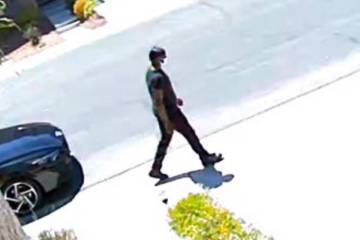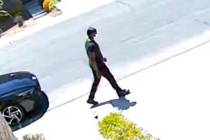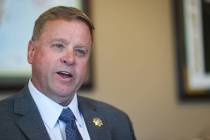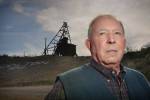Half-century in public life has given Richard Bryan timeless perspective
It was a Wednesday.
Easy enough for former U.S. Sen. Richard Bryan to remember, even though the calendar flipped to that Wednesday a half-century ago.
It was the Wednesday that Bryan was accepted to the State Bar of Nevada.
It was the Wednesday before John F. Kennedy was assassinated.
The young attorney scurried to the side of one of Las Vegas’ most reputable legal families, the Foleys. Together they huddled around the radio for news from Dallas. How grave was it? Is this really happening?
The crackling sounds eventually made it clear: Kennedy was dead, and so, in Bryan’s mind, was an era in U.S. history when the first family reflected the innocence of families nationwide.
Those who know Bryan, still practicing law in Las Vegas and sharp-minded at 75, speak of his unmatched ability to tell an intriguing story. Indeed, he has a tale — complete with the roster of players from 50 years in court and in public life — that captures the essence of each phase of his seven decades in Las Vegas, from childhood to service in the U.S. Senate.
“He has the most outstanding memory,” said James Brennan, a former Clark County deputy district attorney and current senior judge with the Eighth District Court.
“I’ve run in five different offices. He’ll tell me when I ran, who I ran against. I don’t even remember who I ran against. I remember what office I ran for, but I don’t remember the year,” Brennan said.
In each chapter, it is clear who paved the way for Bryan’s success: his father, Oscar Bryan, a respected and popular attorney during Las Vegas’ earlier years.
“My father had died in 1961, so there were a lot of lawyers who knew him and were very nice to me: ‘This is Oscar Bryan’s son.’ My father was a big help to me long after he died,” Richard Bryan said.
But, as the younger Bryan commonly says while tapping into his impeccable memory, we’ll get to that later.
PANHANDLING
The Bryans lived in the Huntridge neighborhood when he was a child. It was one of the best neighborhoods in Las Vegas, but to describe it as a wealthy community wouldn’t be accurate. Next door to Oscar, the attorney, was maybe an insurance agent, then a dump truck driver and an electrician.
“There was no sense of a social casteism or economic casteism,” Bryan said, noting that this was during World War II. “Nobody was going to Europe; nobody was going to Hawaii; gas was rationed.”
As a child, Bryan attended the first movie at the Huntridge Theater. It was a Saturday matinee, a serial, the type that were previously only aired on the radio.
“It was 1944. The admission for kids was supposed to be 14 cents. There was a huge long line, almost all the way back to my house,” Bryan said. “All the sudden, and I’m only 7, the admission is 25 cents, not 14 cents. So I had to panhandle 11 pennies. My first fundraising effort; not my last.”
Certainly not his last: the lifelong Democrat served in the state Senate, was elected governor and ultimately elected to represent Nevada in Washington, D.C.
We’ll get to that later.
THE WEINER RULE
One might think it was one of Nevada’s iconic politicians — perhaps Senate Majority Leader Harry Reid or former Gov. Mike O’Callaghan — who had the greatest influence on Bryan’s career, but that is not the case.
Bryan was 26 when he was accepted into the State Bar and quickly went to work for the Foley brothers’ law firm. His first assignment was to attend a Boulder City Council meeting where there was a fiery debate over a golf course.
Bryan doesn’t recall the matter specifically, but noted the irony that similar issues continue to haunt the city today.
This was the meeting that shaped Bryan’s character. It was here where he decided the type of man, the type of attorney, the type of politician he wanted to be.
George Franklin Jr. was the city attorney and lawyer Don Winn was embroiled in the case.
“No lawyer was less prepared than I,” Bryan recalled. “Neither of those two guys sought to embarrass me because of my lack of knowledge. I escaped, but I never forgot that these are the guys that could have really embarrassed me in front of a lot of people and chose not to. I said to myself, ‘I’m always going to conduct myself like that.’ ”
The manner in which all Las Vegas lawyers conducted themselves was far different in those days. The camaraderie was unmatched.
“There would be vigorous arguments and clashes of that nature, but it still was an era where you would battle all day in court and say to your adversary, ‘Do you have time for a beer?’ ” Bryan said.
The popular watering hole for Las Vegas attorneys was a place called LuLu’s.
“You’d go over there oftentimes when you were waiting for a jury to come in,” he said. “There would be many beers and a lot of conversation.
“Herman Fisher, God love him, he was a very athletic guy. He’d have a couple shots and want to arm-wrestle everybody.
“George Foley had a great sense of humor.
“Jim (James) Brennan, boy, could he shoot a game of pool.”
Then there was the Weiner Rule.
“Lou Weiner loved baseball, went to every World Series,” Bryan said. “One time, before Roger Foley I think it was, they were setting a trial and motion for October and counsel on the other side said, ‘Your honor! The Weiner rule!’ And the judge said, ‘Oh!’ That just doesn’t happen today.”
BUILDING A LEGACY
Bryan was named Southern Nevada’s first public defender in 1966 and was charged with setting up the office.
It wasn’t as easy as it might sound.
Creating the public defender’s office was controversial enough.
Bryan estimates the local Bar was evenly split. Most attorneys were just fine with the existing setup where the judge would appoint a lawyer from the courtroom audience. It paid $300 for a felony case, $1,000 for a murder case.
To land the job, Bryan leaned on his father’s connections: Sheriff Ralph Lamb and his brother Darwin, a county commissioner.
“I saw this as a great opportunity; it was pretty exciting stuff for me,” Bryan said.
One of his first tasks was to find office space, and he had his eye on a building owned by “the guys from Desert Inn,” he said, referring to Las Vegas gaming pioneer — mobster, really — Moe Dalitz and his sidekicks.
The Clark County Commission rejected his proposal. But District Court Judge John Mowbray was on his side.
Bryan and Mowbray crossed paths in the courthouse the day the public defender’s office was supposed to open.
“Mowbray had a hair-trigger temper, and I can see him really getting worked up about something,” Bryan said.
Mowbray marched toward the young public defender.
“ ‘Today is the day,’ ” Bryan said, pausing to explain that these were Mowbray’s words verbatim. “ ‘That this young man is supposed to be starting the public defender’s office, but they (county commissioners) are playing games with him.’ Oh my God, I had just been appointed, you know? This could be over before it even begins.”
The location was approved during the next County Commission meeting.
‘nicest guy in the world’
“He could associate with anybody, had such a great personality. Nothing seemed to rile him too much,” Brennan said of Bryan. “He knew the business. He was pretty sharp when he was public defender. He had a great personality, a good disposition, honest. He was the nicest guy in the world. Still is.”
Bob Peccole, now an in-house attorney for the family-owned Peccole Enterprises, attended Las Vegas High School with Bryan, bumped into him at Hastings Law School in San Francisco and ultimately became the first attorney Bryan hired in the public defender’s office.
“Richard was so good at organizing, we immediately were a lot better than the attorneys being appointed,” Peccole said. “He helped create a system that not only went statewide, but the federal public defender’s office was created after that. He did that. No question.”
When Bryan broke into the legal arena, Brennan sensed he would soon run for a political office.
“I told him he should remain justice of the peace, keep marrying people and make some money so he’d have some bucks in his pocket and run for state Assembly or Senate,” Brennan recalled. “He parlayed that right up. I gave him bad advice, right?”
Right.
After serving as a state senator from 1972 to 1978, Bryan was elected attorney general.
In 1983, he became governor and served two terms.
He served in the U.S. Senate from 1989 to 2001, where his most significant accomplishment was developing the Southern Nevada Public Lands Management Act. It did away with Bureau of Land Management swaps in favor of a more equitable auction system that generates more money for local governments and allows them to acquire federal land for public purposes such as parks, trails and schools.
The senator opted to leave office in 2001, a surprise to the Democratic Party. A series of factors played into his decision.
Like most federal lawmakers, Bryan worked constantly, leaving little time for family. Plus, the job was changing, and not in a good way.
“The Senate itself was becoming so acrimonious and confrontational,” he said. “It was increasingly polarized and dysfunctional, although nowhere near as bad as is today.”
Lastly, it was the money candidates must raise to run for office.
“I never liked raising money. That was one of the weaknesses I had,” Bryan said. “That was a big issue in my mind, because of the increasing amount of money you had to raise. The numbers had multiplied, and I just didn’t want to do it.”
Ah, money, the one thing Bryan had been so cautious about his entire career.
Peccole described his longtime friend as a liberal who was extremely fiscally conservative.
While working under Bryan in the attorney general’s office, Peccole recalls suggesting that they buy a fax machine so that motions and legal papers could be transmitted quickly between Las Vegas and Carson City.
Bryan would have none of that. Those machines were expensive.
“Here’s the way we got communications back and forth as soon as possible,” Peccole said. “Our investigators would run out to the airport and give them to a Bonanza (Air Lines) pilot flying to Reno, and the investigators up north would pick them up at the airport.”
Brennan can’t help but relay one of the funnier moments of Bryan’s governorship. It was when Johnny Carson made some crack about women in Las Vegas, lightly insinuating that all were prostitutes. Bryan took offense, and made it known.
The next night on “The Tonight Show starring Johnny Carson”?
“He had a big neon light that said, ‘Lighten up, Dick,’ ” Brennan said, chuckling about that long-ago jab.
But seriously, folks.
“I would say that Rich Bryan is sort of an icon as far as just being one of the people in public office that seemed to get along with everybody,” Brennan said. “He was great at settling matters. He always seemed to do the right thing. He was a great senator. Probably about the best nonpolitical politician this state has ever had.”
amazing memory
It’s unlikely anyone in the future will remember the exact date when Bryan will enter his 51st year as a Nevada lawyer. But then again, it’s hard for those who have spent any time with the former senator to imagine another human being with a memory as good as his.
As Peccole puts it, “Oh my God, it will drive you nuts.”
Bryan doesn’t need a smartphone to look up simple facts, such as when Hudson cars were first manufactured.
He has no use for an encyclopedia or Siri to tell him which generals were positioned where at Gettysburg.
“He knows names; he knows dates,” Peccole said. “It will drive you nuts if you’re around him.”
Bryan will list the names of the judges in each department in 1965 and every single district attorney who served in the state.
He will cite law cases and years and will attach names to faces he ran into while campaigning in Winnemucca.
Perhaps his only lapse in memory is when he forgets to “get to that later.”
RICHARD BRYAN
• Born July 16, 1937, in Washington, D.C.
• Graduated from University of Nevada, Reno in 1959
• Graduated from Hastings College of Law in 1963
• Deputy district attorney, 1964-66
• Public defender, 1966-68
• Assembly member, 1968-72
• State senator, 1972-78
• Nevada attorney general,1979-83
• Governor of Nevada, 1983-89
• U.S. senator, 1989-2001
• Shareholder and practicing attorney, Lionel Sawyer Collins, since 2001.
• Wife: Bonnie
• Three children: Son Richard Bryan Jr., a cardiologist in Reno; daughters Leslie Bryan Hart, attorney with Lionel Sawyer Collins, and Blair Butler, a teacher in Minneapolis
• Six grandchildren
LAS VEGAS REVIEW-JOURNAL




























